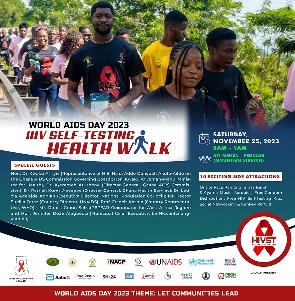Ghana HIV and AIDS Network (GHANET), in collaboration with the Network of Persons Living with HIV (NAP+), and other stakeholders, is organizing a health walk to among others, create more awareness on the HIV Self-Testing (HIVST) tool kit that was launched recently and also mark World AIDS Day (WAD) which falls on December 1.
This year, the theme for the WAD celebration is "Let Communities Lead’ and it is intended to ginger up persons who are infected and most affected by HIV and AIDS to take up roles and initiatives that can help end the disease as a public health concern by 2030".
On Saturday, November 25, 2023, the walk will start from Ayi Mensa at 0600 hours and end at Peduase where there will be solidary statements from government officials, development partners, and civil society organization leaders, as well as persons living with HIV (PLHIV).
Special dignitaries who have been invited to participate in the walk include Dr. Kwaku Afriyie (Representative of H.E. Nana Addo Dankwa Akufo-Addo on the GAC Governing Board); Hon. Kwaku Agyeman-Manu (Minister for Health), Dr. Kyeremeh Atuahene (Director-General, GAC); Dr. Patrick Kuma-Aboagye (Director General, GHS); Dr. Leticia Adelaide Appiah (Executive Director, National Population Council); Mr. Hector Sucilla Perez (Country Director UNAIDS); Prof. Francis Kasolo (Country Representative, WHO), Mr. Daniel Craun-Selka (PEP and Jennifer Dede Afagbedzi (Municipal Chief Executive, La-Nkwantanang-Madina).
Some of the side attractions include onsite colour splashing; onsite face painting; live brass band music; live gyama music; live instructor-led aerobics; free condom distribution; free HIV self-testing kits; social networking; photo opportunities; and a kenkey party!!!
Across the country, similar walks will be held in some regional capitals. The general public is invited.
Background:
In 1988 the UNAIDS designated the 1st of December as World AIDS Day (WAD) in remembrance of persons who had lost their lives to the then ravaging HIV and AIDS menace. The day was also to be used to create awareness about the pandemic and encourage people to protect and prevent themselves from getting infected. The initiative was embraced by countries around the world and, since then, it has always been celebrated with both global and locally adapted themes.
Earlier, in July this year, the Minister for Health, Kwaku Agyeman-Manu, officially launched HIVST in Ghana at a ceremony that was hosted by the Mayor of Accra, Elizabeth Sackey, and chaired by Nii Ahele Nunoo III (Abolo Mantse, Ga State Atofotse) at the Omanye Aba Hall of the Accra Metropolitan Assembly (AMA).
At the time of the launch, the only approved form of self-testing, as per the country’s guidelines, was the oral method. Thus, with the support of the Global Fund, the Ministry of Health (MoH), through the Ghana Health Service (GHS), successfully piloted the use of OraQuick HIVST in about 50 districts. Whilst the pilot was ongoing, other HIVST methods were evaluated by the National AIDS/STI Control Programme (NACP) to expand HIVST options in Ghana.
Owing to the success of the evaluations, the country has now revised its guidelines to include blood-based methods of HIVST. This revision has now opened a window of opportunity for companies such as Abbott to introduce their CheckNOW HIVST in the country, giving Ghanaians a variety of choices.
CheckNOW is a blood-based method of HIVST that gives test results in just 15 minutes. It is based on a 3rd generation HIVST technology that detects HIV-1 and HIV-2 antibodies in a fingerstick blood sample.
The NACP has expressed confidence that the multiplication of HIVST testing options will help the country to achieve the first 95 of the 95-95-95 UNAIDS targets. Currently, only about 72% of the estimated 354,000 persons living with HIV in Ghana know their status. This means that about 100,000 PLHIV are not aware of their status and may be inadvertently spreading the virus.
Press Releases of Wednesday, 22 November 2023
Source: GHANET













